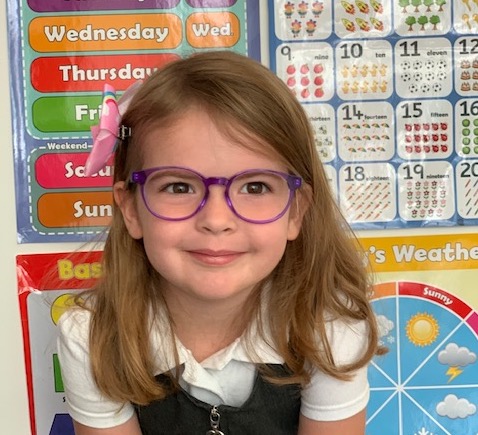We are all hoping that our children can return to school this September. And after nearly four months at home we’re bound to be busy running through our check list of all the things they’ll need; bigger uniform, school shoes, stationary etc. But it’s also really important to add ‘book an eye test’ to your to do list.
Eye health is an essential part of your child’s development and should be part of any other health check like visiting the dentist or doctor. Children’s eyes are still developing throughout early childhood, up to around the age of 7 or 8, so problems treated early can make a lasting difference. Yet research shows that around 20% of school-aged children have an undiagnosed vision problem (1).
These vision problems can affect their learning and development. Studies have found a clear link between visual ability in young children and reading and writing levels. Children with reduced visual acuity (a measure of how well we view detail) had significantly lower literacy development even when other factors – such as demographic, socio-economic and cognitive skills – were taken into account. (2)
It’s also vital that your children’s eye tests should be carried out regularly. At least every two years, or more, if we recommend it and regardless of how well you think they can see. Regular eye tests can make sure that issues are detected and treated earlier, helping your child to achieve their best at school and socially.
Children’s eye examinations are free through the NHS up to the age of 16 years and up to 19 years if they are in full-time education.
How you tell if your child has a problem with their vision?
Does your child
- Frequently squint or frown
- Rub their eyes a lot
- Close one eye when they read or watch TV
- Often complain of tired eyes or headaches
- Seem sensitive to light
- Struggle to read at long distances, for example when looking at the board at school
- Find it hard to learn to read
- Often miss words or lines when they read
If so, they may have a problem with their vision.
Some of these symptoms can be misdiagnosed as dyslexia or other learning difficulties so it’s vital you find out exactly what’s causing them as soon as you can. It may be that all your child needs is a pair of glasses.
Common eye problems in children
There are a number of different eye problems that can be detected during an eye examination. These include (3):
- childhood cataracts – cloudy patches in the lens of the eye that are present from birth
- lazy eye (amblyopia) – where the vision in one eye does not develop properly
- squint (strabismus) – where the eyes look in different directions
- short-sightedness (myopia) – where distant objects appear blurred, while close objects can be seen clearly
- long-sightedness (hyperopia) – where you can see distant objects clearly, but nearby objects are out of focus
- astigmatism – where the transparent layer at the front of the eye (cornea) is not perfectly curved
- colour vision deficiency (colour blindness) – difficulty seeing colours or distinguishing between different colours; this is more common in boys than girls
When should I take my child to see the optician?
Your health visitor will check your child’s eyes soon after they are born and again when they’re six weeks old. The next test should be when your child can recognise pictures, usually around the age of two or three. However, if your child is younger but you have concerns about their sight, please book an appointment with us. We are able to get an indication of their vision using alternative testing.
The College of Optometrists recommends children should have their vision tested once a year until they reach their teens and then once every other year if they have good sight. The test doesn’t take long, is free and young children do not need to be able to read or recognise letters to take it.
What if my child needs glasses?
If we detect a problem during your child’s eye examination the chances are it can be easily rectified with spectacles or contact lenses. If this is the case we’ll discuss with you the best options for your child and prescribe accordingly.
We stock a wide range of children’s glasses in our practices including Wolf Cubs, Wolf Teens, Wills by William Morris London, Guess, Ted Baker Kids, Joules Kids, Kids Vision, Whiz Kids and Lazer Junior alongside the stunning Tomato Glasses. We currently have an offer on Wills by William Morris of ‘buy one frame and get a second frame’. Contact us in the practice for more details.

To book an appointment for your child please call 01628 663055.
Please be aware that due to current Covid restrictions we can only offer appointments only. We are hoping to resume normal working hours from 1st September.
References
- https://www.aop.org.uk/advice-and-support/for-patients/childrens-eye-health/why-vision-matters
- http://www.visionmatters.org.uk/news/news/post/105-16million-school-aged-children-estimated-to-be-living-with-an-undetected-vision-problem#_ftn3
- https://www.nhs.uk/conditions/eye-tests-in-children/

